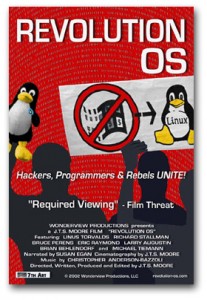Anon is having a brainstorming session on 14th April, all day, to discuss “a parallel internet”. You can find their IRC room at: irc.anonops.net #anonsec
Tip of the Hat to Om Goeckerman at Google Group Distributed Decentralized Internet.
Anon is having a brainstorming session on 14th April, all day, to discuss “a parallel internet”. You can find their IRC room at: irc.anonops.net #anonsec
Tip of the Hat to Om Goeckerman at Google Group Distributed Decentralized Internet.
building-a-distributed-decentralized-internet@googlegroups.com
YAY Bucky Fuller!
Strangely enough, with all the nightmare scenario's currently playing out, their corollary, our best dreams are also playing out.
The stuff about being targeted and persecuted, shut-down etc. becomes irrelevant in the face of a few billion users who are able to leapfrog the existing infrastructure and communicate directly with one another. Meanwhile the Electronic Frontier Foundation (EFF) would probably be happy to extend their wing for us to gather under.
The prolific depth of mobile phone access around the world, along with the radical decrease in cost of web capable devices, paints a picture of a planetary population about to demand an alternative method of communicating besides paying a monthly fee to some telco.
Cheap hardware plus electricity should equal communicative ability!
If we don't do it, some kid in Kinshasa will – well, she will, whether we do it or not.. maybe she already has.
There are also other discussions happening and the most relevant I see is this one:
Anon is having a brainstorming session on 14th April, all day, to discuss “a parallel internet”. You can find their IRC room at: irc.anonops.net #anonsec
In terms of sheer numbers of users and real world trial and error/lessons learned recently with the efforts to support Egypt, Tunisia, Libya, Yemen, Bahrain, Syria, China using a variety of ‘darknet' and packet management techniques; there is a very compelling case for us all to attend.
This is a user community that would gravitate toward anything that worked ‘better' and are very capable of driving a meme into production.
In the end, everyone will gravitate to whatever works better. Slow and free with a prospect of getting much, much, faster is also qualified as being ‘better' by a growing population. Slow, free and available in the bush is also ‘better' for about four Billion people. Enough to start things off anyway. By the time it gets fast enough, Western consumers will gladly jump onboard.
Tip of the Hat to Om Goeckerman at Google Group Distributed Decentralized Internet.
Phi Beta Iota: Infinite free energy is close and will not be “locked up.” That will enable local to global clouds. Open Farm approach applied to Open Communications is going to take us the rest of the way, starting with OpenBTS (Range Networks).
Freed journalist: Iranian regime's ‘information fears'
 Maziar Bahari faces jail if he returns to Iran
Maziar Bahari faces jail if he returns to Iran
Iranian journalist Maziar Bahari was held in a Tehran jail for 118 days in 2009. His arrest came as he worked for western media outlets, including BBC Panorama. In this analysis, Mr Bahari explains why the regime fears information, the internet and a free press.
“Information is a weapon, and in the wrong hands it is even more dangerous than a real gun!”
This was my torturer's message to me in the summer of 2009 after my arrest.
See Also:

88+ Projects & Standards for Data Ownership, Identity, & A Federated Social Web
emergent by design, April 11, 2011
by Venessa Miemis
As we become more comfortable with sharing ourselves on the ‘social web,’ we’re revealing a lot of valuable information about our interests, preferences and social connections, and it’s strewn across the web in many different 3rd party silos. One slice of me may be at home on Facebook, another segment of relationships and topics I follow are on Twitter, my online buying habits are known by Amazon and eBay, and a range of companies unknown to me are tracking the ‘digital exhaust’ I leave as I visit websites and travel around the web. There is a growing recognition of the value of all this data to assist us in decision-making, and a concern about who owns it currrently and what’s being done with it.
According to a recent W3C report, there are at least 4 main issues that arise when our data is trapped in 3rd party walled gardens:
1. Portability – The option of taking my personal information and social connections with me across any platform or marketplace is unavailable to me, so I’m forced to reenter and duplicate my data over and over again on different websites.
2. Identity – Instead of having a federated identity that is secure and interoperable across any website, I have an overwhelming (and growing) amount of usernames, passwords and accounts, making my online identity fractured and fragmented.
3. Linkability – People may be mentioning me or sharing photos of me on networks in which I am not a member, making that information invisible to me.
4. Privacy – Once I upload or add content to a site, I have no way of controlling the context of how it’s shared or creating permissions for what can be done with it.
In light of these concerns, I’ve been exploring the emerging tools and solutions for personal data ownership, unified online identity, and a federated social web that puts the user at the center of their online experience.
One of the recurring themes I’ve seen is the call for “personal data stores” or “personal data lockers.” This is the idea of a database that would store all of your personal information. The range of its functionality varies, but here is a comprehensive overview of what it could entail (from Mydex site):
Below is a list I’ve been assembling of startups, open source projects, organizations, and standards that are defining what this next stage of the web will look like, where individuals are empowered by the ownership and understanding of their data and ability to verify identity. I’ve done my best to organize these, but am open for suggestions of how to arrange the list more usefully. And as always, if I’ve missed some vital information, please add to the comments section and I’ll keep the post updated.
Read complete article with all eight-eight links in context….
found this site of project comparisons on GNU social site. perhaps something useful here?
Commodity webhosting approach
StatusNet .. Crabgrass .. ownCloud .. Diaspora .. Elgg .. Cyn.in .. Lorea .. Pinax .. Open Atrium .. SMOB .. BuddyPress .. Daisychain .. Partuza .. The Appleseed Project .. Socknet .. Get6d .. Knowee .. Dutch .. exo Social .. DiSo .. Movim .. Jappix .. HelloWorld .. OpenCollab .. Kopal .. RSSN .. Noosfero.. Friendika .. NOT FREE: iSocial .. Persona .. Safebook
Federation of Servers approach
XMPP .. OneSocialWeb .. Google Wave .. Mycelia .. PSYC .. Higgins ..
Peer-to-peer (P2P) / Distributed Hashtable (DHT) approach
GNUnet .. I2P .. Tahoe LAFS .. CSpace .. Angelapp .. RetroShare .. The Circle .. Sydnie .. Netsukuku .. Peerscape .. NOT FREE: LifeSocial .. PeerSoN .. Opera Unite .. Osiris ..
Social desktop applications
Nepomuk for KDE .. Social Desktop for KDE ..
In-browser profile + certificates approach
None
Distributed Node Architecture
Distnode

REVOLUTION OS tells the inside story of the hackers who rebelled against the proprietary software model and Microsoft to create GNU/Linux and the Open Source movement.
On June 1, 2001, Microsoft CEO Steve Ballmer said “Linux is a cancer that attaches itself in an intellectual property sense to everything it touches.”
Microsoft fears GNU/Linux, and rightly so. GNU/Linux and the Open Source & Free Software movements arguably represent the greatest threat to Microsoft's way of life. Shot in cinemascope on 35mm film in Silicon Valley, REVOLUTION OS tracks down the key movers and shakers behind Linux, and finds out how and why Linux became such a potent threat.
REVOLUTION OS features interviews with Linus Torvalds, Richard Stallman, Bruce Perens, Eric Raymond, Brian Behlendorf, Michael Tiemann, Larry Augustin, Frank Hecker, and Rob Malda. To view the trailer or the first eight minutes go to the ifilm website for REVOLUTION OS.
Two books below the line…

Dominic Basulto on April 4, 2011, 9:57 PM
bigthink
Whether consciously or not, most of us subscribe to a PC-centric view of the Internet, in which everything revolves around content that is created or accessed via a PC or Mac. However, that is about to change as mobile increasingly becomes the new paradigm for both creating and consuming content. Quite simply, the Web is about to experience a Copernican moment. Before Copernicus, it was widely believed that everything – including the Sun – revolved around the Earth, rather than the Earth revolving around the Sun. In the same way, it might be quaint one day to believe that everything once revolved around the PC rather than the mobile device.
The easiest way to understand this Copernican moment is to understand the extent to which mobile is becoming the new paradigm for the way we use the Internet. In terms of hours of usage, total content consumed and amount of data created, 2010 was the year of the mobile device. Keep in mind that the average teen now sends more than 3000 text messages each month! And that trend is only accelerating in 2011 as social networking rapidly migrates to the mobile device.